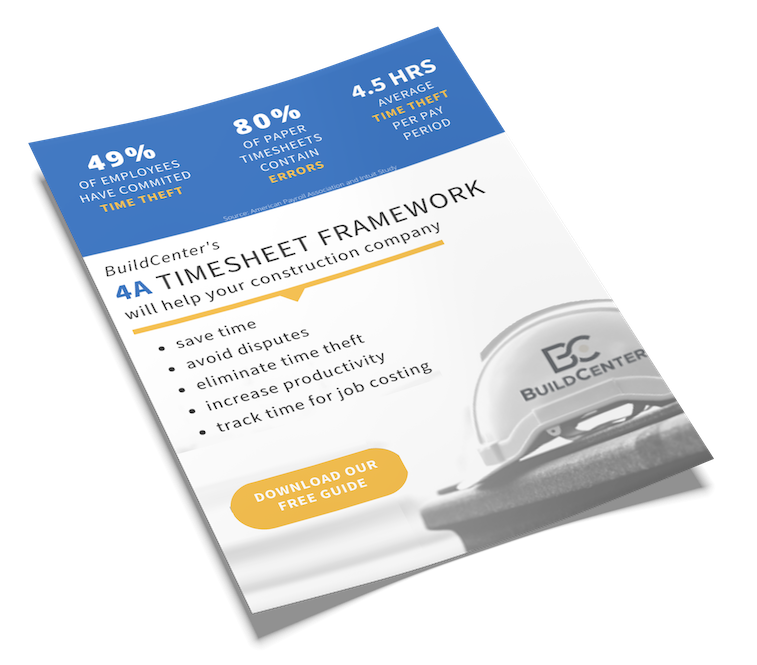Wage theft is the denial of wages rightfully owed to an employee. It can occur in many ways, among them failing to pay overtime; violating minimum-wage laws, the misclassification of employees as independent contractors, illegal deductions in pay; forcing employees to work “off the clock”, not giving an employee their final check, etc.
In construction, payroll practices can vary widely among general contractors and trade contractors. Most have an established process to collect timesheets and pay workers accordingly. Many, however may not understand the risks of inaccurate timesheets or skirting the law by avoiding paying overtime with various tactics.
3 days ago, I was shocked to read a news article about one of my regular subcontractors facing 20 felony counts of Workers Compensation Premium fraud, EDD fraud and wage theft. The charges alleged they failed to pay almost $1 million to employees. This is serious and it could happen to anyone if you are not careful and following the letter of the law.
In this blog post, we’ll cover how to make sure your timesheets are compliant and well documented to protect against any payroll disputes. We will also discuss how you can transition from “some funny business” to being able to sleep well at night.
What is Wage Theft
Wage theft occurs when workers do not receive their legally or contractually promised wages.
Common forms of wage theft are:
- non-payment of overtime
- not giving workers their last paycheck after a worker leaves a job
- not paying for all the hours worked
- not paying minimum wage
- not paying a worker at all
Why is Wage Theft Important?
The risks associated with Wage Theft are simply too high. All it takes is one employee to file a complaint with the labor board or some other government agency and you will be investigated. Even if you are innocent, an investigation will cause stress and anxiety and a lot of money to defend yourself with lawyers and proceedings. By implementing a few important strategies and processes, you can minimize the risk to your construction company.
Two Real Examples of Wage Theft (not on purpose)
Re-allocation of over-time
Another subcontractor of mine (electrical sub) explained to me that he keeps his guys busy but he doesn’t pay them overtime. As an example, one week his guys may need to work 45 hours (5 hrs of OT). The following week might be light and they only have 30 hrs of work to complete. The owner has a general understanding with the workers that he pays them 40 hrs for each week regardless. Now, this policy could favor the employee but it puts this business owner at serious risk. All it would take is one worker to complain and he will face major consequences.
Paying Cash for Overtime
In the case of my subcontractor that is facing 20 felony counts, he apparently did pay his workers overtime. The problem is, he paid them in cash. The workers loved it and it saved him expenses for payroll taxes and workers compensation premiums. Win-Win right? Wrong. Paying in cash usually doesn’t come with documentation of payment. This is the problem now because it looks like he didn’t pay them when he did. Furthermore, he would have avoided payroll taxes and potentially workers compensation premiums….which is crime. Paying cash for work is risky. All it would take is one worker to file a complaint and you have a major problem that could ruin your business.
3 Tips to Avoid Wage Theft Claims
Establish clear policies and procedures
Having a good employee handbook that outlines how time is recorded and submitted for payroll is important. The handbook can spell out your payroll period and when checks are processed. It should explain your overtime policy and if it requires pre-approval (legally, you have to pay overtime regardless if it was approved). In essence, the employee handbook is a way to get on the same page with workers with regards to your policies and procedures for payroll and other important business activities. Once in place, you can hold your workers accountable for following the handbook.
If you need to update your handbook or implement one for the first time, check out our free construction company handbook template as a starting point.
Aim for 100% accurate timesheets
Having accurate timesheets that have all the needed information on them including the workers’ signature will help protect you and the company. This is easiest to accomplish with a digital time tracking system like BuildCenter. The construction app allows workers to clock in and out easily on their phone with GPS location stamping.
Be compliant with labor laws OR at least move in that direction
When people first start out, it’s not easy to make it and that can cause some to “bend a few rules”. With all the taxes, forms, premiums, licenses, etc it can be overwhelming and feel like you have no choice but to do things that are not fully compliant. As your business grows, however, you need to move in the right direction and clean up those practices. It simply isn’t worth the risk.
Summary
Wage theft is a problem that can sneak up on you if you are not careful. Workers must be paid for all the hours they work and that should be documented well so that you are protected from wage theft claims. There are many tools like employee handbooks and time tracking systems like BuildCenter that can help elevate your business to the next level.
Resources
- Check out our free Employee Handbook Template made specifically for the construction industry.
- Start the Free Trial of BuildCenter to start tracking time with greater accuracy.
- Review the A4 Timesheet Framework: A Free Guide. Click here to get the free guide




